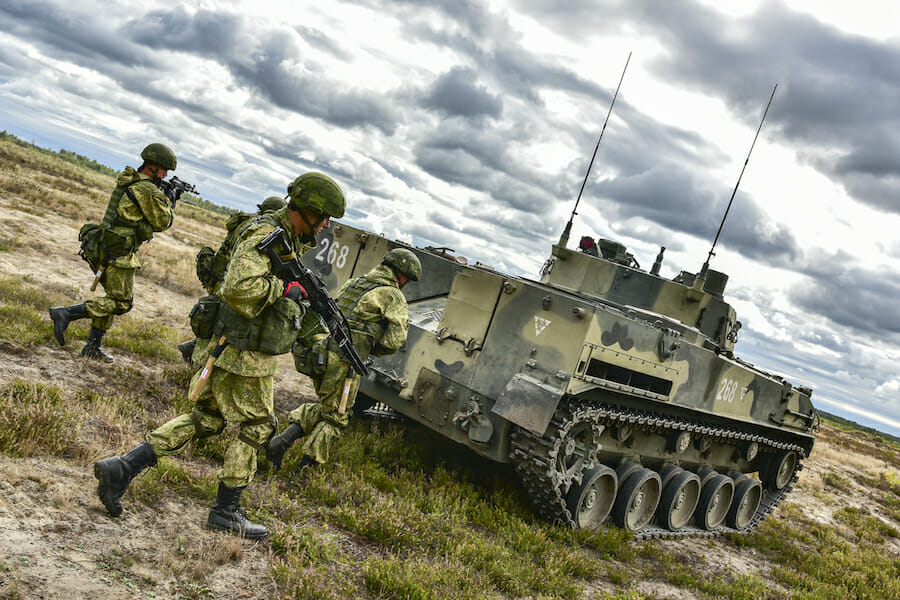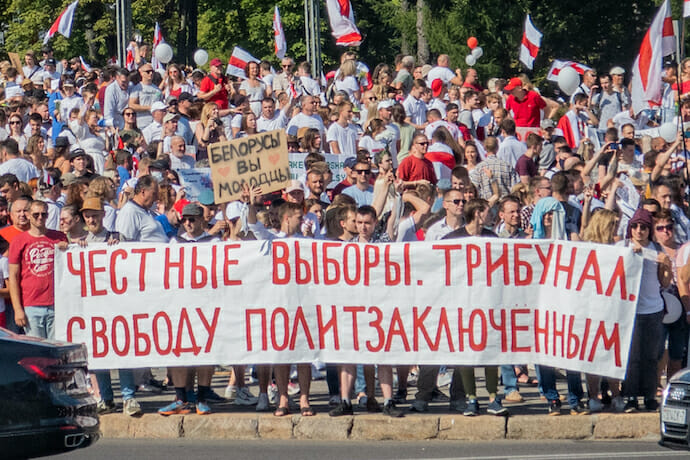
Why Putin Will not Send Tanks into Minsk
The 2020 Belarus protests have attracted media attention from all around the world. As such, the coverage has tended to lean towards increasingly attention-grabbing theories and headlines. The most controversial of these seem to suggest an imminent Russian invasion of Belarus: “Why Russia Is Getting Ready to Invade Belarus,” or “Russia deploys tanks to Belarus’ border”. Considering Russia’s history with its neighbours, it is no surprise that such headlines are popular.
Why does a Russian invasion sound conceivable?
Russia has developed a notoriety for invading post-Soviet states that have strayed westward and out of its sphere of influence. The most important examples, which influence the theories foreseeing the invasion of Belarus, are Georgia in 2008 and Ukraine in 2014. In the case of Georgia, it embarked on a process of making alliances with the West in order to break out from Russia’s sphere of influence. In 2004, a bloodless revolution overthrew the pro-Russian government, and Mikheil Saakashvili was elected with a definitively Western-leaning agenda. In 2008, Georgia was on the verge of joining NATO, which would have signaled its ultimate breakaway from Russia. The Russian invasion in 2008 ensured that this did not happen.
In 2014, an eerily similar process took place in Ukraine preceding the invasion of Donbass and Crimea. Protests broke out after the government had suspended the signing of an association agreement with the EU, which would have strengthened Ukraine’s ties with the European Union and would have weakened its political and economic affiliation with Russia. The ensuing Euromaidan protests ousted Viktor Yanukovych’s pro-Russian government, forcing him to flee the capital. Unmarked Russian soldiers appeared a few days after in Crimea.
In both of these cases, Russia was attempting to keep a post-Soviet state in its sphere of influence in the face of a pro-Western movement. The threat posed to the pro-Russian Lukashenko by the recent protests falsely suggests the same conclusion.
Why these precedents tell us nothing about Belarus
At first glance, the events in Belarus could appear similar to those in Ukraine and Georgia. A pro-Russian government of a post-Soviet state being threatened by protests calling for democratic change does indeed seem to fit the pattern. However, this interpretation ignores a major factor. Unlike in Georgia and Ukraine, Belarusian protests and the opposition were never anti-Russian, and Lukashenko was never a close Putin ally. According to a study conducted by the Moscow State Institute of International Relations, 90% of Belarusians want friendly relations with Russia, with only 0.2% preferring a more distant affiliation.

Not just the population, but the opposition forces are also, without question, pro-Russian. On August 17th, a letter from Maria Kolesnikova, a member of Sviatlana Tsikhanouskaya’s campaign team, was read out on a Russian radio station. She informed the public that Tikhanovskaya’s future government strives to restore the historically friendly Belarusian-Russian relationship, which deteriorated under Lukashenko. Despite sounding like a purely strategic move from the opposition, the Lukashenko-Putin animosity is not unfounded.
Why Lukashenko is an unreliable ally
Despite appearing in both local, Russian, and Western media as old friends and allies for the past two decades, the relationship between Vladimir Putin and Alexander Lukashenko could be best described as capricious and opportunistic. Lukashenko’s interest is keeping a hold onto power in Belarus whilst maintaining a friendly relationship with Putin. However, these often contradict each other.
During the early 1990s, Lukashenko initiated the formation of a State Union between the two countries. However, after Putin’s rise to power, none of the parties hastened the ratification of the agreement. According to certain theories, Lukashenko strived to become president of the newly formed Russian Federation, as a leader of a member state of the federation, but Putin’s rapid ascension thwarted his aspirations.
According to a report by Jane’s Information Group, Russia’s primary interest in the relationship is keeping the oil and gas flowing towards Europe, given the pipes go through Belarus. In exchange for the safe passage of Russian oil and natural gas, Russia heavily subsidizes oil and gas sales to Belarus. This means that the relationship between the countries places an enormous financial burden on Russia’s economy: €50 billion a year.
The first manifestation of colliding interests was an energy dispute in 2004. The state-owned firm Gazprom offered to purchase 50% of Belarus’s pipeline system, which Lukashenko’s government declined. To improve its bargaining position, Gazprom raised prices to a point still far below market value. Belarus refused to pay, and Gazprom shut the pipes pumping fossil fuels to Belarus. Lukashenko’s government promptly proceeded to siphon oil from the pipeline leading to Europe, stealing 80,000 tons of crude oil. The exact same conflict occurred in 2007, resulting in tens of thousands of tons of crude oil stolen and growing tension between Russia and Belarus. The first clear sign of political antagonism occurred before the 2010 Belarus elections when a Gazprom-owned Belarusian TV channel conducted a smear campaign against Lukashenko.
Russia’s strategic interest in Belarus
It could be argued that Russia’s geopolitical interests might outweigh its economic interests in Belarus, and a military intervention could be initiated in order to stop Belarus from improving its relations with the West. However, unlike Georgia and Ukraine, the Belarusian opposition has shown no explicit intent so far to join NATO or establish closer ties with the European Union.
On the contrary, the consequences of military intervention could be catastrophic to the Russian economy. The profound negative impact of international sanctions is not negligible. With an invasion, Russia would very likely be subject to harsh new sanctions, which would be detrimental to its economy and pose a great threat to the political stability of Russia. The Russian government would benefit very little.
The Russian government issued a statement on August 19th. Russia will not intervene in the affairs of Belarus, as long as no foreign power meddles in Belarus either. It was emphasised that so far, they see no sign of foreign interference, thus Russian intervention is not an option. A few days later at a pro-government rally, Lukashenko declared that he suspects Lithuania and Poland of meddling, and Belarus’s borders and sovereignty are under threat. He emphasized that these are the borders of not just Belarus but the Russia-Belarus State Union. Lukashenko urging a Russian intervention represents a very rapid change of heart, considering that just back in May 2020, he was publicly accusing Russia of interfering on the opposition’s behalf.
The Russian government’s most likely course of action is implicit, non-military support of Lukashenko’s regime, or simply patience and preparation to negotiate with the new government. The events of the 2018 Armenian Velvet Revolution serve as an important precedent, where the Russia-friendly government was ousted by a new power. Instead of opting to intervene, Moscow chose to establish a friendly relationship with the new leadership, saving an enormous sum of money on sanctions and the cost of military operations. If Lukashenka were overthrown, Russia’s most plausible response is similar to what happened in Armenia.

